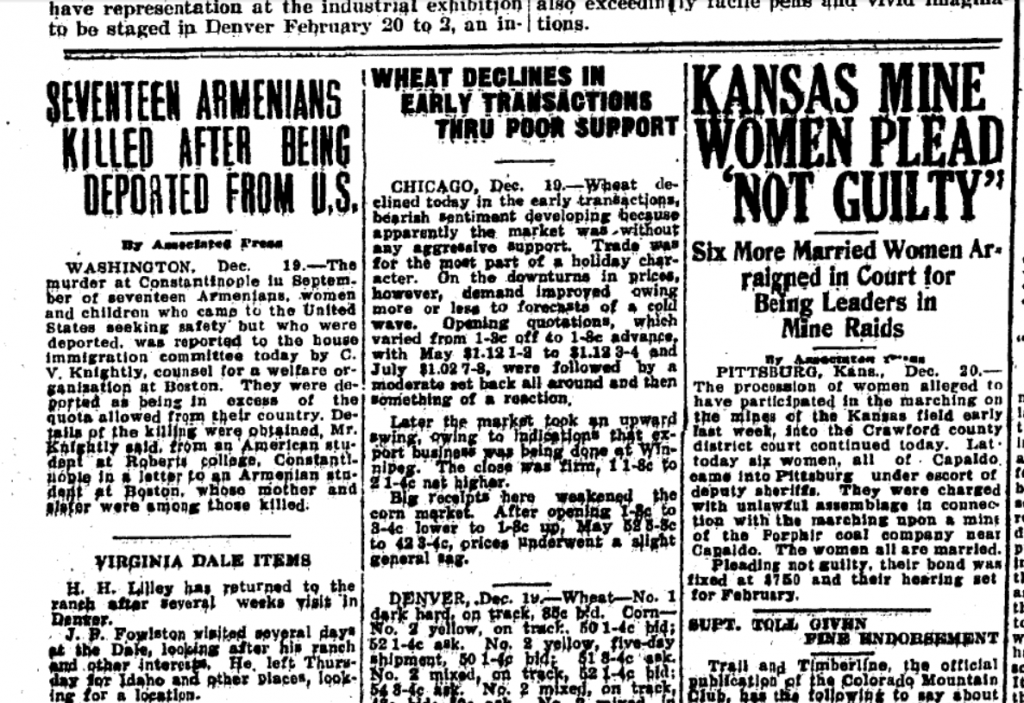Special for the Armenian Weekly
2016 ended with a historic United States election.
The Republican Party had the carpet pulled out from under them by an outspoken billionaire who outlined a country under threat by religious extremists on one hand and industrialized states who sucked the humble American worker dry on the other. His statements on women, immigrants, and Muslims shocked many.

The Democratic Party faced a crisis of conscience. Two forces clashed—one, a product of its neoliberal past, trying desperately to reform its image to fit with the changing times, and the other, a compassionate defender of the middle class against billionaires and corporations.
Many progressives, young and old, let out sighs of defeat, which turned into shouts of anger when the Democratic establishment sought to hand the nomination to a candidate it thought was best suited to defeat an underestimated newcomer.
After months of analysis, pundits across the country and across the world felt Secretary Hillary Clinton had all but secured the 2016 U.S. presidential election. On the night of Nov. 8, 2016, into the early morning of Nov. 9, as a sign of the times, many stared at their handheld devices and television screens in utter disbelief that the woman who had served in innumerable political offices exited American politics.
All the pundits, the political establishments, the think tanks, were all wrong, just as they were wrong about the Brexit referendum that took place less than five months earlier.
Shortly after his election, President Trump moved quickly to sign Executive Order after Executive Order: to repeal the Affordable Care Act, to order the construction of a wall along the U.S.-Mexico border to curb undocumented immigration, and to bar refugees from many countries from entering the US.

Many across the nation engaged in protests against his actions, to protect women’s rights, to accept more immigrants, and protest an administration that many believe will prove to be sexist, racist, and homophobic.
The skeletons in the closet were laid bare for all to see as historical documents such as the St. Louis Manifest—a document listing the passengers of the St. Louis, a German ship that departed from Hamburg, Germany carrying over 900 Jews and stateless people on May 13, 1939, in an effort to find refuge in the U.S.— reemerged. The fates of many were sealed when they were refused entry to the U.S., having no choice but to return to Europe. Most of the passengers of the St. Louis perished at the hands of Nazism.
Armenians had suffered a similar fate less than two decades earlier…
“SEVENTEEN ARMENIANS KILLED AFTER BEING DEPORTED FROM U.S.”
Headlines don’t come much clearer—or more chilling than this; even if it was written a little more than 95 years ago…
The Associated Press’ short news release about the Constantinople murder of seventeen Armenian women and children “who came to the United States seeking safety, but who were deported” was printed by the Fort Collins Courier on Dec. 20, 1921. They were deported as being “in excess” of the quota allowed from their country. According to the article, details of the killing were obtained from a letter written by an Armenian student at Roberts College in Constantinople to an Armenian student in Boston whose mother and sister were among the killed.
Over a century ago, Armenians were exiled from their ancestral homes in the Armenian provinces of the Ottoman Empire. Braving the death marches through the desert of Deir ez-Zor, they settled in Egypt, Iraq, Lebanon, and Syria.
They were tired and hungry, and many of them were sick, carrying with them typhus and lice that ravaged the Middle Eastern theater. Most of them were poor farmers and unskilled workers, not the merchants, lawyers, and craftsmen that we erroneously pride our nation to be comprised of. Huge refugee camps had to be built for the starving orphans and refugees, some of which still exist today.

The most important thing to consider here was that the camps were built. Had the Arab—and mostly Muslim—population of the time closed the doors on our ancestors’ faces the same way that Trump has closed the door on their grandchildren today, our nation would have been wiped out; maybe not instantly, but certainly not much later than that.
Our ancestors found refuge—even a little prosperity—and a safe place to develop our culture. The hub of Western Armenian culture was first Istanbul, then Egypt, then Lebanon and Aleppo. Through the extermination and subsequent existential crisis our nation would have faced, much of our identity and culture would have been wiped out.
To aid the refugees of today is the only way to honor the sacrifices their ancestors made to help our ancestors. Anything else would be a shame we would never be able to erase from our conscience.
Fifty years ago, the entire world went through profound change. It had come to a tipping point. Human society had to once-and-for-all answer the age-old question: are we all equal or should one be subservient to the other due to their race, gender, sexuality, etc.?
The questions of national liberation, women’s liberation, and human decency were thrust on the table with an anger that could not have been ignored. Words like “solidarity” became a part of everyone’s vocabulary. Irish Republicans sought inspiration from the Black Panthers; Kurds declared solidarity with the Palestinian struggle; Asian American students went to rallies with Hispanic American students demanding their rights and greater visibility in their campuses; nations in Africa and Asia were winning their independence from their colonizers.
In this revolutionary wave, Armenians the world over took part in the first commemoration of the Armenian Genocide. Before this, the verabrogh serunt (generation of survivors) could not discuss the genocide—the trauma felt was too great. Something they experienced in this era broke the chains of that trauma.
Today, these age-old social issues have once again reared their heads. Women’s rights are again under threat; the youth are out of work or are working unfulfilling jobs while amounting insurmountable debt, unable to meet the pressures to be, wealthy, mobile, and successful, that their families and society have placed on them; racial minorities are facing open and systemic racism; Native American land is being violated; decent and affordable housing and healthcare are hard to find; and basic human decency is under assault. In response, many of these groups have organized and restarted the fight for their rights.
In a huge show of force, on Jan. 21, over three million participated in marches for women’s rights across the U.S.
Native Americans in North Dakota are blocking an oil pipeline that would desecrate their sacred burial sites and risks poisoning their only source of fresh water.
African-Americans have formed Black Lives Matter to protest police brutality and racism.

Last year, over 36,000 Verizon workers went on strike to stop the exportation of their jobs and cuts to health and retirement benefits. On April 24, 2016, during the commemoration of the 101st anniversary of the Armenian Genocide, members of the Armenian Youth Federation (AYF) and fellow hamakirs (supporters) marched from the Turkish Consulate in Boston to the Armenian Heritage Park. It just so happened that Verizon strikers were camped near the route. The strikers looked tired and cold, but determined. Somebody in our crowd yelled “We support unions!” A couple isolated claps were heard, but not much else. A month later, Verizon strikers won many of their demands. Today, we are still fighting for genocide recognition…
Our people and our communities have reached a crossroads. We can continue the same ways of the past, or we can blaze a new trail for the Armenian Cause. The old tactic of being the apolitical, quiet, obedient ethnic minority has long exhausted its usefulness. The recent Four-Day War in Artsakh (Nagorno-Karabagh/NKR) and the suffering our people are experiencing in Syria are evidence that a change is needed.
Famed Armenian writer Avetik Isahakyan once proclaimed, “Life is a fierce, harsh struggle.” Without struggle there is no victory. The old world is dying and a new one struggles to be born. The time is now to do away with the vestiges of that bygone era and do our part to forge a more just society. To ignore this spark is to keep the fight for our rights in stasis until another generation comes along and breaks out of the shell of apathy.
Let us be that generation.


Yes! Excellent article. It is heartening to read this in an Armenian publication.
This op-ed was profound. Thank you for writing it Garen. Gives me hope to see sentiments like this expressed from among our community.